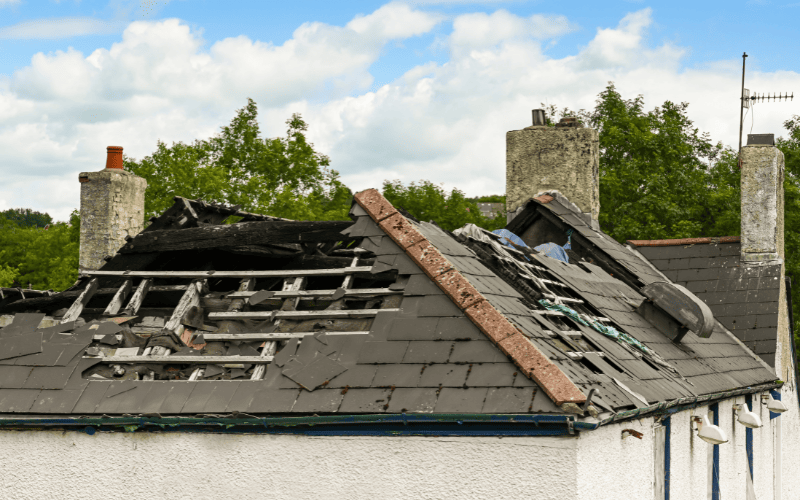Property Damage Insurance Claim Attorney | Ethen Ostroff Law
Facing property damage can be difficult. It becomes even more challenging when your insurance company denies your claim. However, a denied property insurance claim doesn’t always mean you can’t get compensation. Here, Ethen Ostroff Law explains the common reasons for claim denials, the actions you can take to contest the denial, and the advantages of hiring a lawyer specializing in property damage insurance claims. Ethen Ostroff Law and its partners will guide you through the insurance claims process and help you seek the compensation you’re owed.
What is property damage?
Property damage refers to the physical harm or destruction caused by accidents, natural disasters, intentional actions, or negligence to someone’s property. Properties like homes, buildings, vehicles, personal items, or public structures can sustain damage.
What is property damage claim?
A property damage claim is the process of asking compensation from the insurance company or responsible party for the damage caused. Property owners can file this claim to get reimbursement for replacement or repairs to restore damaged property to its pre-damaged condition.
What are the types of property damage?
The two primary types of property damage are physical injury and loss of use. Damage in both cases can cause financial burdens and inconvenience for the owner. Insurance property damage coverage protects owners from these risks and provides them compensation for repair or replacement.
Physical injury is the harm or damage caused to tangible objects or structures. It involves the actual physical destruction or deterioration of a property. Examples of physical injury include:
- A car involved in a collision sustained dents, scratches, or broken parts.
- A house is damaged by a fire, resulting in charred walls, a collapsed roof, or destroyed furniture.
- A mobile phone screen cracked or shattered after being dropped.
Loss of use refers to the situation where the property is rendered unusable or inaccessible due to an incident or event. Examples of loss of use include:
- A rental property became uninhabitable for tenants after a flood until repairs were done.
- A commercial building damaged by a fire became unusable for business operations.
- A car involved in an accident requires extensive repairs, making it unavailable for use during the repair period.
What are the types of property damage claims?
The specific type of property damage claim depends on the cause and the circumstances surrounding it. The common types of property damage claims are:
- Auto Property Damage Claims: Damage to vehicles resulting from accidents, collisions, theft, or vandalism.
- Homeowners or Property Insurance Claims: Damage to residential properties, including houses, condos, or rental properties, due to fires, water damage, storms, theft, or vandalism.
- Personal Property Insurance Claims: Damage or loss of personal belongings.
- Commercial Property Damage Insurance Claims: Damage to commercial buildings, offices, retail stores, or warehouses from fires, floods, storms, vandalism, or other perils.
- Natural Disaster Claims: Damage to property because of hurricanes, tornadoes, earthquakes, wildfires, or floods.
- Public Liability Claims: Property damage resulting from someone else’s negligence or wrongful actions.
- Product Liability Claims: Property damage caused by a defective product.
- Landlord-Tenant Claims: Damage caused by tenants or landlords to rental units because of negligence, like unauthorized alterations, neglect, intentional damage, or failure to maintain the property.
- Subrogation Claims: Claims filed by insurance companies to recover expenses after paying out a claim to policyholders.

What types of insurance policies cover property damage?
The types of insurance policies that cover property damage include:
- Homeowners Insurance: For residential properties, like dwelling, personal belongings, liability protection, and additional living expenses
- Renters Insurance: For tenants, including personal belongings, liability protection, and additional living expenses
- Condo Insurance: For condominium owners, including the interior of the unit, personal belongings, liability protection, and additional living expenses
- Commercial Property Insurance: For commercial buildings, inventory, equipment, and fixtures for businesses
- Landlord Insurance: Insurance for landlords for structure, liability protection, and potential loss of rental income.
- Builder’s Risk Insurance: For property under construction or renovation, protecting against property damage or loss during the construction process
- Flood Insurance: For damage caused by floods, including the structure and contents
- Earthquake Insurance: For damage resulting from earthquakes, including the structure and contents
- Specialty Insurance Policies: For specific types of property or assets, such as art, jewelry, or antiques, tailored to their unique risks
What are the key aspects of property damage insurance coverage?
Having the right insurance coverage in the event of damage or loss to your property can provide financial security and peace of mind. Here are some key aspects of property damage insurance coverage that can help make informed decisions to safeguard property effectively:
- Covered Perils: Insurance policies specify the events or perils that are covered, such as fire, lightning, explosions, windstorms, hail, vandalism, theft, and water damage.
- Dwelling Coverage: Covers the structure of your property, including walls, roof, foundation, and attached structures like garages, providing funds for repair or rebuilding after covered perils.
- Personal Property Coverage: Extends to personal belongings like furniture, appliances, electronics, clothing, covering the cost of repair or replacement if damaged or destroyed by covered perils.
- Other Structures Coverage: Includes coverage for structures like detached garages, sheds, fences, or guest houses, following the same coverage as the main dwelling.
- Actual Cash Value vs. Replacement Cost: Coverage can be based on the depreciated actual cash value or the cost of replacing the damaged property without factoring in depreciation.
- Out-of-pocket: expenses paid before insurance coverage starts, with the deductible amount stated in the policy.
- Liability Coverage: Protects against property damage or injuries caused to others, covering repair costs, medical expenses, and legal fees in case of lawsuits.
- Limits and Exclusions: Policies have maximum coverage limits, and certain perils or types of damage may be excluded. Reviewing the policy helps understand these specifics.
- Additional Endorsements: Customizable coverage additions for specific items or perils not covered in the standard policy.
- Additional Living Expenses Coverage: Covers temporary accommodation, meals, and living expenses if the property becomes uninhabitable due to covered perils.
- Specific Peril Coverage: Separate policies or endorsements for specific risks like earthquakes, floods, or other natural disasters not covered in standard policies.
How to file a property damage claim?
Filing a property damage claim involves following specific steps to ensure a smooth and efficient property or commercial property damage insurance claims process. The following steps are typically involved in the insurance claims process when property damage occurs:
- Contact your insurance company promptly to report the property damage, providing essential information like policy number, date, and description of the incident.
- Document the damage with photographs or videos and create a detailed list of affected items with their value.
- Take steps to prevent further damage, such as temporary repairs or professional assistance.
- Gather supporting documentation like receipts, invoices, and repair estimates.
- Cooperate with the insurance adjuster during the assessment and investigation of the claim.
- Obtain repair estimates from reputable professionals and submit them for evaluation.
- Review your policy to understand coverage limits, deductibles, and exclusions.
- Evaluate the settlement offer carefully and seek professional advice if needed.
- Accept the settlement and follow instructions to complete the claim process.
- Use the settlement amount to proceed with repairs or replacement, following insurance company guidelines.

How soon can you file a property damage claim?
The statute of limitations sorts how much time you have to file a property damage claim. The laws of your state decide this time limit. The time limit usually ranges from 1 to 10 years. To know the correct deadline, consult with a local attorney who knows about property damage claims. They can help you with the specific time limit that applies to your case.
How are property damage claims paid?
Here’s how property damage claims are paid through a process involving the insurance company and the policyholder:
- The insurance company will assign a claims adjuster when a property damage claim is filed. The adjuster will investigate, evaluate documentation, and review evidence.
- The adjuster will assess the damage and determine coverage, including deductibles, limits, and exclusions that impact the claim amount based on policy terms.
- The insurance company will calculate the payment, considering repair costs, replacement value, actual cash value (ACV), and depreciation.
- The policyholder will pay the deductible out of pocket deducted from the claim payment.
- The insurance company will present a settlement offer to the policyholder, specifying the approved amount and payment details.
- The policyholder may accept the offer or negotiate for a higher amount by providing additional evidence or negotiations.
- Once settled or negotiated, the insurance company will disburse payment via check, direct deposit, or electronic transfer.
- With the payment, the policyholder can proceed with repairs or replacement, following insurer guidelines.
- The payment process varies among insurers, policies, and claim circumstances. Disbursement time ranges from days to weeks. Disputes may require further communication or legal assistance.
What happens when a claim is declined?
When your claim is declined, the insurance company has determined that your circumstance or property damage is not covered by your insurance policy. When this happens:
- The insurance company will explain why they denied your claim in writing or through a claims adjuster.
- Carefully read your insurance policy to understand coverage, exclusions, and limitations that may apply to determine if the denial is valid based on policy terms.
- Contact the insurance company to get a clear explanation if the denial is unclear or you disagree. Ask for details on specific policy provisions or exclusions that led to the denial.
- If you believe the denial is unfair, consult a licensed insurance professional like a public adjuster or an attorney specializing in insurance law. They can guide you, review the denial, and help negotiate with the insurance company.
- Insurance policies often outline dispute resolution processes like mediation or arbitration. Consider these options if the denial remains unresolved.
- Keep detailed records of all communications, denials, policy documents, and evidence related to the claim. These records are useful for further pursuing your claim or taking legal action if needed.
- Depending on the circumstances and denial extent, reassess your options. Explore alternative avenues for compensation, such as legal action or other applicable insurance coverage.
What happens if your homeowner's insurance claim is denied?
If your homeowner’s insurance claim is denied, the following happens:
- The insurance company will provide a written explanation why it denied your claim.
- Read your homeowner’s insurance policy carefully to understand coverage, exclusions, and limitations. Compare the denial explanation with the policy provisions to verify the validity of the denial.
- Contact your insurance company or claims adjuster for further clarification. Ask for a detailed explanation of the specific policy provisions or exclusions that led to the denial.
- Consider consulting a public adjuster or an attorney specializing in insurance law. They can provide guidance, review the denial, and assist with negotiations if needed.
- If appropriate, you can appeal the denial. Follow your insurance company’s appeals process, which may involve submitting additional documentation, evidence, or presenting your case to a higher authority.
- If your appeal fails to resolve the denial, you can consider mediation or arbitration to settle disagreements.
If you believe the denial is incorrect or unfair, you can seek legal advice and pursue a lawsuit against the insurance company. Carefully evaluate the potential costs and outcomes before taking legal action.
In what circumstance would a property insurance claim be rejected?
Common reasons for claim rejections include:
- Situations or types of damage not covered under the insurance policy, like intentional acts, wear and tear, gradual deterioration, or certain natural disasters.
- Failed to meet policy requirements, like timely reporting, providing documentation, cooperating, and mitigating further damage.
- Provided inaccurate or incomplete information during the insurance application.
- The policy has lapsed due to non-payment or failure to renew.
- The damage or loss was intentional or involved fraud.
- Failed to provide sufficient evidence to show the cause or extent of damage.

How do insurance companies challenge a claim?
Property damage insurance claim lawyers face different tactics from insurance companies. These include:
- Alleging that losses do not entitle a policyholder to compensation
- Denying a claim for an invalid reason
- Denying a claim without providing an explanation
- Delaying a claim
- Misrepresenting policy details
- Playing hardball during negotiations
How do I win a denied property damage insurance claim?
You can increase your chances of winning a denied property insurance claim by:
- Reviewing the coverage, exclusions, and limitations of your policy that apply to your claim.
- Understanding the reasons provided for the denial and clarifying if needed.
- Collecting relevant documentation and evidence that supports your claim.
- Seeking advice from professionals specializing in insurance claims.
- Following the insurance company’s appeals process.
- Promptly providing any additional information or documentation requested.
- Keeping detailed records of all communication related to your claim.
- Considering mediation or arbitration.
- Consulting with a lawyer specializing in insurance law if all else fails.
What is the role of a personal injury lawyer in denied property damage claims?
Having your property damage claim denied can be overwhelming. That’s where property damage insurance claim lawyers’ step in to handle the legal aspects for you, allowing you to focus on your recovery and moving forward with your life. They can guide you through the legal process by:
- Helping you understand your rights and obligations
- Interpreting your insurance policy
- Assessing the strength of your claim
- Determining the value of your claim
- Communicating with the insurance company
- Representing you in court if necessary
Why choose Ethen Ostroff Law for your denied property damage claim?
When choosing a law firm to handle your denied property insurance claim, Ethen Ostroff Law and our partner firms offer the following reasons so you will consider our services:
- We focus on personal injury law, including property damage claims.
- We have teams of skilled and experienced denied property damage claims attorneys.
- We bring personalized attention and support throughout the claim process. Client satisfaction is our priority.
- We have a network of experts, like appraisers, engineers, and contractors, who can assess the extent of your property damage and give expert opinions to strengthen your claim.
- Ethen Ostroff Law and our affiliated firms are tough negotiators and litigators.
- We keep our clients updated on their claim’s progress.
- We have a track record of getting favorable outcomes for our clients.
- We operate on a contingency fee basis. We will only collect attorney fees if we recover compensation for your claim.
Getting denied for a property damage claim doesn’t mean you can’t keep fighting for compensation. Improve your chances of success by learning why your claim was denied, taking action to challenge the denial, and getting support from a property damage insurance claim lawyer.
What are you waiting for? Contact Ethen Ostroff Law now at 610-510-8883 ( by calling this number, you consent to receive SMS) or Submit Form to get free consultation.
* By calling Ethen Ostroff Law at 610-510-8853, you consent to receive SMS.


